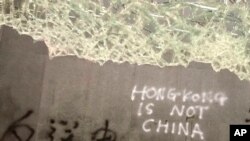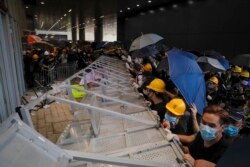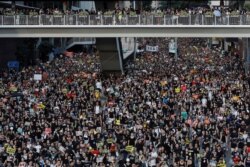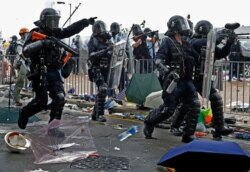On July 1, a crowd in Hong Kong protesting a controversial bill allowing extradition to mainland China broke through tempered glass and charged into the city's legislative chamber. They defaced officials' portraits and spray-painted anti-government graffiti. Police gave the protesters until midnight to leave, or be expelled by force.
Most protesters left, but four refused. Then, just before midnight, several people rushed into the chambers, shouting, "We leave together! We leave together!" They pulled away those remaining inside.
That act, more than the broken glass and graffiti, has knit together the anti-government movement in Hong Kong and sustained a protest effort that has seen massive crowds for weeks. The unofficial policy of the campaign — "no division" — is a sharp contrast from the 2014 democracy campaign that dissolved into bitter fights that left the opposition camp fractured.
"It was the government that created the desperation," said Fernando Cheung, a lawmaker who was one of several legislators who tried to stop the July 1 break-in. Government officials "were hoping that after the storming they could win the public support and do it through condemnation and standing on the moral high ground."
But the public is not playing along, he said. "It is a political confrontation. It is a government issue. By resorting to treating these as crimes and criminals, it's not dealing with the core of the problem."
'We have to be united'
People who have advocated for peaceful protests said the way the break-in ended drew widespread sympathy, not censure.
"It's the rescue [on July 1] that made people sympathetic," said Shirry Heung, a volunteer in the 2014 movement called Occupy Central with Love and Peace. Like many protesters, she uses an English name for fear of being prosecuted for opposing the government.
Heung joined the annual march for democracy July 1, the anniversary of Hong Kong's handover from Britain to China. As the march progressed, she heard youngsters begging participants to detour toward the legislature to support people trying to break in. "'It's very dangerous,'" she heard them say. "Come help us! You can ensure our safety!'"
Heung said she didn't agree with occupying the legislature, but the government had not responded to weeks of marches, vigils, ad campaigns, international appeals and requests for meetings.
"What we have learned since 2014 is we have to be united and we will all do our part and try to see what we can do together, instead of splitting," she said.
During the 2014 campaign to get Beijing to allow voters to choose the Hong Kong chief executive without interference, student groups did not support an initial short-term occupation idea. Instead, they seized a public plaza that the government had gated off. That touched off the 79-day occupation of a highway, and shorter sit-ins in two major business districts that drew tens of thousands of people.
The demands were met with silence from Hong Kong and Beijing.
After that, the pro-democracy camp splintered more. The bitter fighting soured many residents on political protests altogether.
What began to heal the divisions were prosecutions.
The government put students, professors and longtime activists on trial for various public disorder charges related to the protests. Many of the defendants went to prison. A six-year prison sentence for Edward Leung, once a legislative candidate who promoted revolution, was widely condemned by pro-democracy supporters as a vindictive, political move to silence young people.
Growing frustration
When Carrie Lam, Hong Kong's chief executive, introduced the extradition bill in February 2019, she said it would allow a murder suspect held in Taiwan to be tried, which would bring justice to the family of his dead girlfriend. But the prospect of extradition to China provoked fury among activists and political opponents in Hong Kong.
By early June, an estimated 1 million people marched against the law. On June 12, young people surrounded the legislature, only to be fired upon by police using rubber bullets and tear gas. Scores were seriously injured.
When Lam suspended the bill, but refused to abolish it, 2 million people protested, demanding Lam resign and release people arrested in the protests. She refused.
Then, on July 1, hundreds of young people who began marching to commemorate Hong Kong's return to China were beaten back by police with batons and pepper spray. Hours later, several young people used metal carts and poles to break most of the ground-floor windows and doors of the legislature. Once inside, they vandalized the building. One person noted that the government had taught them that peaceful protests do not work.
Beijing officials, some international newspapers and some foreign officials criticized the forced entry. Some commentators worried that it would derail the massive democracy effort that had widened to demand full voting rights and free elections.
Instead, the protests have continued. Sunday, July 7, saw the demonstrations move into districts away from the government center. Marchers walked on busy streets in Tsim Tsa Tsui, popular with shoppers from mainland China.
"We don't have to agree with every person," said Nadia, a 29-year-old who works at an investment bank. "I'm not brave enough to take that step. … I didn't know kids were brave enough. The grownups should be the ones protecting them. Instead, they are protecting us."








